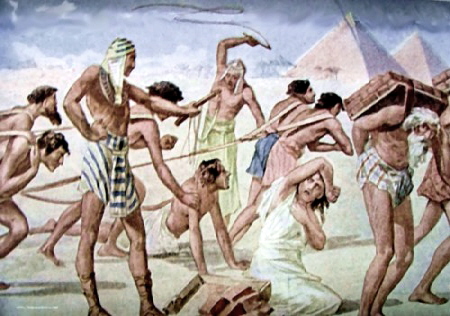
A Lesson About Patience
A Lesson About Patience
Shalom,
This Shabbat we will read the Torah Portion “Ki Tavo” in the book of “D’Varim”.
“Woe to the pampered one who has never been trained to be patient. Either today or in the future he is destined to sip from the cup of affliction.” (Rabbi M. M. Leffin)
Researches in psychology show that when people frequently lose their patience to one another, they start acting like enemies and eventually become real enemies.
A lot of times, losing patience is related to continuous stress situations which a person experiences…
Our Sages taught: A man should always be gentle like Hillel, and not impatient like Shammai.
The Talmud tells us the following story about a person who tried to make Hillel angry by asking him supposedly strange and foolish questions:
It once happened that two men made a wager with each other, saying, He who goes and makes Hillel angry shall receive four hundred zuz.
Said one, I will go and incense him.
That day was the Sabbath eve, and Hillel was washing his head. He went, passed by the door of his house, and called out, “Is Hillel here, is Hillel here?”
Thereupon he robed and went out to him, saying, “My son, what do you require?”
“I have a question to ask”, said he.
“Ask, my son”, he prompted.
Thereupon he asked: “Why are the heads of the Babylonians round?”
“My son, you have asked a great question”, replied he: “because they have no skillful midwives.”
He departed, tarried a while, returned, and called out, “Is Hillel here; is Hillel here?”
He robed and went out to him, saying, “My son, what do you require?”
“I have a question to ask”, said he.
“Ask, my son”, he prompted.
Thereupon he asked: “Why are the eyes of the Palmyreans bleared?”
“My son, you have asked a great question”, replied he: “because they live in sandy places.”
He departed, tarried a while, returned, and called out, “Is Hillel here; is Hillel here?”
He robed and went out to him, saying, “My son, what do you require”
“I have a question to ask”, said he.
“Ask, my son”, he prompted.
He asked, “Why are the feet of the Africans wide?”
“My son, you have asked a great question”, said he: “because they live in watery marshes.”
“I have many questions to ask”, said he, “but fear that you may become angry.”
Thereupon he robed, sat before him and said, “Ask all the questions you have to ask”.
“Are you the Hillel who is called the nasi of Israel?”
“Yes”, he replied.
“If that is you”, he retorted, “may there not be many like you in Israel.”
“Why, my son”, queried he.
“Because I have lost four hundred zuz through you”, complained he.
“Be careful of your moods”, he answered, “Hillel is worth it that you should lose four hundred zuz and yet another four hundred zuz through him, yet Hillel shall not lose his temper.”
So, how is all that related to our Torah portion?
Well, the following verse appears in Torah portion “Ki Tavo”:
וַיָּרֵעוּ אֹתָנוּ הַמִּצְרִים וַיְעַנּוּנוּ, וַיִּתְּנוּ עָלֵינוּ עֲבֹדָה קָשָׁה
“The Egyptians caused evil with us and afflicted us, and they put upon us hard labor.” (Deuteronomy 26:6)
Rabbi Alsheich asks a question on this verse: according to Hebrew grammar, the Torah should have written:
…וַיָּרֵעוּ לָנוּ הַמִּצְרִים…
“The Egyptians caused evil to us…”
Why does the Torah use the language “they caused evil with us”?
Rabbi Alsheich answers:
The Torah used the word “with us” in order to tell that through the enslavement that the Egyptians cast upon the nation of Israel, they turned the people in the nation of Israel to evil.
The hard work caused a state where the people in the nation lost their patience and became evil to each other.
In Israel, (where, unfortunately stress is in abundance) one can frequently hear the following expression:
רגע, סבלנות
REGA, SAVLANUT!
Take a moment – be patient!
The Hebrew word for patience is SAVLANUT.
Its root is סבל and from the same root another word is derived – SOVLANUT which means “tolerance.
סבלנות – SAVLANUT– Patience
סובלנות – SOVLANUT– Tolerance
The same root gives rise to words that means “suffer” (SEVEL) and “burdens” (SIVLOT).
We learn from this that patience is not a necessarily always a pleasant experience.
To be patient is not an easy thing, it is actually hard work.
It might be the hard work we usually find it to be.
That may actually mean that to reach the state of patience is to be ready for bearing a burden, enduring and tolerating.
And maybe TOLERANCE is what we all need now as the Hebrew New Year approaches.
Shabbat Shalom
Yoel & Orly
Planning to spend the holidays in Israel?
Don’t miss our H2 immersion courses and outdoor activities!
The ‘Holiday Hebrew’ (aka H2) course is a three-day immersion experience in which you will have an opportunity to both learn Hebrew and enjoy the Holiday atmosphere in Israel.
So if you are in Israel anytime between September 27 and October 22nd, don’t settle for anything other than making
Hebrew a part of your Israel experience!
For details please contact us at:
https://www.ulpanor.com/contact/
Many ask us for a permission to redistribute our newsletters. By all means, please do feel free to forward this newsletter to anyone you wish!
Access the archive of our previous posts at:
https://www.ulpanor.com/category/blog/
Subscribe to our newsletters on our website at the bottom of the home page:













